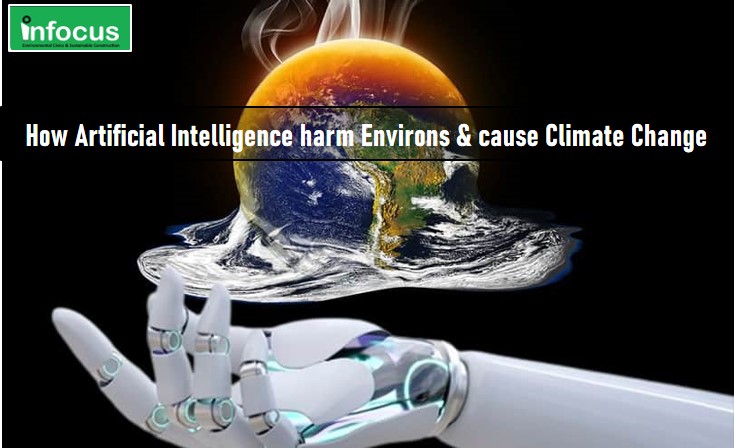The evolution of Artificial Intelligence (AI) has been hailed as a significant leap to tackle climate change crisis. AI tools that predict weather, track icebergs, recycle more waste and find plastic in the ocean are supposed to be helping to combat climate change. However, as the transformative power of AI continues to fuel innovation, concerns are rising about its negative impacts on the environment. Environment researchers and academics have now expressed that the environmental repercussions of Artificial Intelligence’s meteoric rise are a cause for genuine concern, causing climate change.
Questioning Digital Sustainability of Artificial Intelligence:
No doubt, the Artificial Intelligence is welcomed as a game-changer. Scientists believed by providing real-time information on environmental conditions and predicting natural disasters, AI could help prevent environmental damage and protect human lives. Besides, by optimizing energy consumption and reducing waste, it could help in reduce greenhouse gas emissions and conserve natural resources. But beneath its transformative potential lies a pressing concern: its environmental impact. As the development, maintenance, and disposal of AI technology all come with a large carbon footprint, which questions its digital sustainability. AI programs that generate new information, making the whole thing “much more energy-intensive” and accelerate climate crisis.
Generative AI’ Emissions:
According to the International Energy Agency, the combined AI and the cryptocurrency sectors consumed nearly 460 terawatt hours of electricity in 2022 which is the 2% of total global production. Digital researcher Sasha Luccioni, therefore, believes that Generative AI uses 30 times more energy than a traditional search engine. “I find it particularly disappointing that generative AI is used to search the Internet,” laments the researcher, who spoke on the sidelines of the ALL In Artificial Intelligence Conference this month in Montreal. She demonstrated that producing a high-definition image using artificial intelligence consumes as much energy as fully recharging the battery of your cell phone.
Although Microsoft and Google have committed to achieving carbon neutrality by the end of the decade, the US tech giants saw their greenhouse gas emissions soar in 2023 because of AI: up 48% for Google compared to 2019 and 29% for Microsoft compared to 2020. That’s why Luccioni says “We are accelerating the climate crisis” and called for more transparency from tech companies.

Carbon Footprints:
As data sets and models are becoming more complex, the energy needed to train and run AI models becomes enormous. This increase in energy use directly affects greenhouse gas emissions, aggravating climate change. According to OpenAI researchers, the amount of computing power required to train cutting-edge AI models has doubled every 3.4 months since 2012. By 2040, it is expected that the emissions from the Information and Communications Technology (ICT) industry as a whole will reach 14% of the global emissions, with the majority of those emissions coming from the ICT infrastructure, particularly data centers and communication networks. These data demonstrate the urgent need to address AI’s carbon footprint and role in environmental deterioration.
Other Impacts on Natural Ecosystems:
Despite their operation in a virtual space, AI and the cloud have considerable tangible effects. They not only intensify greenhouse gas emissions and consume hefty amounts of energy, but require larger quantities of natural resources. This emerges, in one form, through harsher impacts on natural ecosystem. Like;
- AI applications like driverless autos and delivery drones pose a threat to animals and natural environments. Automation fueled by AI may result in greater consumption as well as increasing waste in certain sectors.
- The rising use of AI in agriculture could result in the overuse of pesticides and fertilizers, contaminating the soil and water, and harming biodiversity.
- The e-waste produced by AI technology poses a serious environmental challenge. The World Economic Forum projects that the total amount of e-waste generated will have surpassed 120 million metric tons by 2050.
Artificial Intelligence is one of the key emerging technologies, invented by mankind. It is unavoidable, but has repercussions on natural habitat. The question here is not to oppose the AI, but rather to choose the right tools and use them judiciously.
By
Editorial, Infocus


